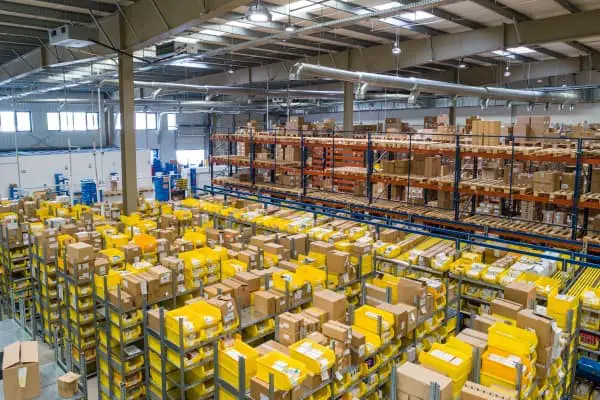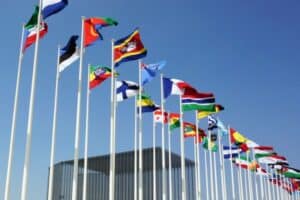This page contains affiliate links. This means if you a follow a link and make a purchase, at no additional cost to you, Humanitarian Careers will receive a commission. Thank you for supporting the site.
Many people want to get a job working for the United Nations. UN jobs are generally well paid, highly prestigious and you get to work helping people around the world. If you work in logistics, or supply chain management, and are interested in working for the UN, there are a huge range of roles open to you.
The United Nations has an enormous need for qualified and experienced logisticians. We’ve put together this guide to help people with knowledge of logistics and supply chain management find a role in the United Nations. It’s also aimed at those looking for a UN career who are wondering if training in logistics may be their route in.
UN Agencies Recruiting Logistics Jobs
If you are looking to work for the United Nations is a logistics or supply chain role, the first step you need to do is gain an understanding of which UN agencies regularly recruit logisticians.
The UN is a huge organisation and its procurement, supply and logistics needs are enormous. Almost every part of the UN will have a logistics department or be supported by a supply chain team. However, there are some UN agencies that have an even greater need for logisticians. These agencies are the ones most commonly recruiting for logistics roles:
- United Nations Development Programme (UNDP)
- UNICEF (UN’s Children’s Agency)
- World Food Programme (WFP)
- World Health Organisation (WFP)
- UN High Commissioner for Refugees
- UN Office For Project Services
- international Organisation for Migrations
Let’s go over each of these in-turn…
United Nations Development Programme (UNDP)
UNDP works with poorer countries to alleviate poverty. They run a huge range of development projects and regularly recruit logisticians and supply chain staff to coordinate the supplies these need.
UNICEF (UN’s Children’s Agency)
UNICEF is the UN children’s agency. They run development projects providing children in extreme poverty with education, healthcare, nutrition, water and sanitation and shelter. They also respond to humanitarian crises by running emergency programmes assisting children and young people. UNICEF has an extensive need to logistics staff to support their work.
World Food Programme (WFP)
The World Food Programme aims to combat famine and hunger by providing both emergency relief and long-term assistance. They are heavily logistics focused, needing to move millions of tones of food supplies often into remote locations.
WFP also hosts the humanitarian Logistics Cluster – the coordination group for humanitarian logisticians.
World Health Organisation (WHO)
The WHO is the UN’s global health agency. WHO often recruits logisticians and supply chain staff, especially medical logisticians, in order to respond to health crises around the world.
UN High Commissioner for Refugees (UNHCR)
UNHCR is the UN’s refugee agency. It is responsible for assisting hundreds of millions of refugees worldwide. UNHCR often recruits logistics roles in order to coordinate delivering supplies to the areas refugees most need them.
UN Office For Project Services (UMOPS)
UNOPS is responsible for delivering UN projects. This can include large scale infrastructure and development programmes around the world. UNOPS has a huge need for logistics staff who can ensure the supplies needed to complete UN projects are procured, sourced, brought in and stored to ensure the projects can be completed fully and on time.
International Organisation for Migrations (IOM)
IOM became part of the United Nations in 2016. One of it’s core mandates is to provide aid to people on the move. IOM recruits logisticians in similar roles to UNHCR – to ensure that aid supplies are delivered as needed.
United Nations Logistics Roles
The second stage in securing a logistics job with the United Nations is understanding what logistics roles the UN most commonly recruits for.
Across the UN there is a huge range of logistics and supply chain positions. However, some of the most commonly recruited logistics roles in the United Nations are:
- Logistics Officer
- Supply Chain Manager
- Fleet Manager
- Logistics Assistant
- Warehouse Manager
- Procurement Officer
- Medical Logistician
Let’s take a quick look at each of these…
Logistics Officer
The job of Logistics Officer is the mid-level logistics role within the United Nations. The position is responsible for overseeing the procurement, storing, and shipping of supplies. The Logistics Officer is usually stationed at a field base or supports a wider logistics team.
Supply Chain Manager
The UN recruits Supply Chain Managers to oversee complex supply chains and to ensure the required items are delivered on time and where they are needed. As a management role, the Supply Chain Manager will usually oversee the supply chain or logistics team within a UN office.
Fleet Manager
Almost all UN offices have a fleet of vehicles. These are used to transport UN staff between offices or to field locations. Large UN offices will have a Fleet Manager that is responsible for overseeing the coordination, planning and management of the vehicle pool.
Logistics Assistant
The job of Logistics Assistant is the entry level logistics role in most UN offices. They are responsible for providing day-to-day support to the logistics team. Their tasks can include record keeping, liaising with suppliers, getting quotations and sourcing smaller items directly from the market.
Warehouse Manager
Many UN offices need to store large quantities of supplies. Warehouses are vital for the UN and the organisation often employs Warehouse Managers to oversee them. The Warehouse Manager will coordinate the warehouse team and ensure the warehouse is functioning to the correct standards.
Procurement Officer
The UN regularly recruits Procurement Officers to oversee the purchasing of supplies. The job of the Procurement Officer is to manage the purchasing system at a specific UN office. This includes finding suppliers, testing items, getting quotations, completing payments, and keeping records.
Medical Logistician
Some UN agencies recruit Medical Logisticians to oversee the procurement, shipping and storing of their medical supplies.
Qualifications Needed To Get A Logistics Job At The UN
The next step you need to take if you want to get a job in logistics at the United Nations is to get the right qualifications.
There are two main steps to becoming qualified to work in supply chain management, or as a logistician, in many UN agencies. The first is to gain a formal qualification in logistics.
When recruiting for logistics jobs, the United Nations will look for people who have a formal qualification is logistics or supply chain management. The UN is a large and highly complex organisation. It also operates in some of the toughest contexts on earth. Therefore, it’s vital that they recruit logisticians who have a strong knowledge of the technical aspects of the field.
Different logistics roles in the UN will have slightly different requirements when it comes to the qualifications needed. However, in general, if you want to work in a logistics job in the UN, you should become fully qualified in logistics or supply chain management.
As well as general logistics qualifications, the UN has a significant need for staff qualified in procurement, fleet management, warehousing, and medical logistics. Gaining a formal qualification in one of these areas will also help you land a job in the logistics department of a UN agency.
Essentially, you should aim to become a fully qualified logistician before applying for a UN job. Positions at the United Nations are highly competitive, so the more qualified you can become before applying the better your chances will be.
Sadly, the UN will not fund your studies or employ you whilst you complete your logistics qualifications. You will need to become fully qualified before applying for a role with the United Nations.
Although generally a degree, ideally to master’s level, is the most sought-after qualification when the UN is hiring for logistics staff, specialised diplomas in areas of logistics such as procurement, medical logistics or warehouse management may also be accepted.
The second step you should take to become qualified to apply for logistics jobs with the United Nations is to gain a good understanding of the work the UN does. Logistics roles in the UN directly support the implementation of the UN’s projects. This includes supporting humanitarian and development work, as well as disaster responses and assisting refugees.
It’s important when applying to work for the UN that you can demonstrate how logistics supports the types of projects the UN runs. A great way to do this is to take short courses online. There are many short courses that you can take, often for free, that provide you with a good overview of the UN’s work. Adding these to your CV before applying to the UN will help show you have a good understanding of what the United Nations really does.
United Nations Online Courses
For those wanting to work for the United Nations, including in a logistics role, we highly recommend the online course Global Diplomacy: The United Nations In The World. We think it’s one of the best overviews of the UN and it’s work and would be a great addition to the CV of anyone applying for a UN job. Click the link to enrol on the course.
If you want to know more about how to get a job with the UN, including in logistics, then take the United Nations Jobs Guide online course. This course provides great details on the UN recruitment system, what the UN looks for in candidates and what you can do to make your UN application stand out. Follow the link to the course’s page for more information.
If you are looking to work for the UN in a logistics role, we also recommend the online course How To Design and Fund International Development NGO Projects. It covers the key concepts of how humanitarian organisations develop their programmes and the core skills needed to manage finances in the international development sector. Click the link to be taken to the course’s page.
Applying for United Nations Logistics Jobs
The recruitment system used by the United Nations is known for being complex. However, in order get a logistics job at the UN you need to understand the categories the UN uses in its recruitment process.
All jobs in the United Nations, including logistics roles, are split into two main categories. The first is G roles, or ‘general service’. The second is P, or ‘professional’ roles. The naming isn’t great as there’s really nothing more professional about P category jobs. The actual difference between these roles is how they are recruited.
In the United Nations, G positions are only recruited locally. This means you must be a national of the country where the UN office you are applying to is. You cannot apply internationally for G roles in the UN.
P roles, on the other hands, are recruited internationally. The UN P staff are sent abroad to support UN projects. P roles are only open to expatriates. Many people taking P jobs with the UN move between different duty stations throughout their career.
There are also D category jobs at the UN. These are essentially the same as P roles but are more senior.
As well as the letter categories, each UN job is also given a number. This number relates to the level of experience needed to do the role. The higher the number the more years of professional experience are required. This letter and number categorisation is why you will see UN jobs listed as P-3 or G-2, for example.
When applying for logistics jobs with the United Nations you should look for roles that fit both your level professional experience and career aims.
If you are from a country where there is a significant UN presence, consider applying for logistics roles categorised as G. If you’re aim is to work internationally for the UN, you can apply for P jobs after you have gained some experience in the UN system.
If you from a developed nation where the UN does not implement many projects, consider gaining some experience outside of the UN before applying for P jobs – for example by working for an international NGO, a private company that works globally or a government agency.
As well as P and G roles, the United Nations also has a number of internships and graduate programmes. The main three are:
These three schemes all aim to take recent graduates and provide them with practical experience within the United Nations. Generally, these schemes focus on more general roles, and are not usually specific to logistics or supply chain management. However, if you’re looking to work as a logistician in the UN and are a recent graduate, you could consider applying to these schemes, and if successful, transitioning later in your career towards a UN logistics job.
Another programme that can be a good way to begin a career in the United Nations is UN Volunteers (UNV). You need two or more years of professional experience in order to apply to UNV. However, it can be a great way to get your foot in the door of the UN. Volunteer postings are also often for technical roles, meaning specific logistics and supply chain positions are included. If you have already worked as logistician for a few years, either in an NGO or a private company, consider applying for logistics roles with UNV.
One more option to consider when looking to work in the UN as a logistician is to seek out consultancy roles. The United Nations hires a huge number of consultants to complete specific pieces of work. Although most UN consultancies are at a senior level, there are some that require less experience. If you have worked in logistics or supply chain management before, consider applying for consultancies with the UN.
If you want to learn more about how to get a finance job in the United Nations, check out of the top UN online courses here.





